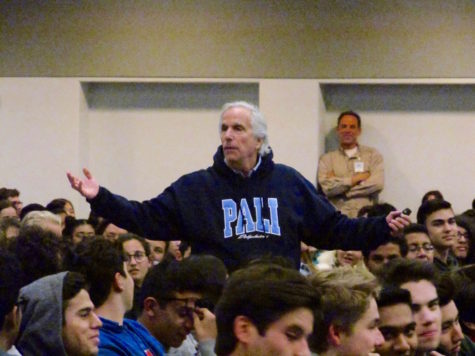Is College Worth It?
A look at the college experience, including preparation and attendance, and whether it lives up to its reputation.
 As school comes to a close and summer approaches, each high school grade level goes through a different transition period. For freshmen, they finally have the high school routine down, but now it is time to hit the books over the summer and get ready for more difficult classes. For sophomores, it is time to start studying for the college entrance exams and other required placement tests, time to start creating a list of colleges they are interested in and time to prepare for the most challenging year of high school yet. For juniors, the most strenuous year of high school is approaching rapidly — the time to decide what lies in their futures after graduation. And finally, the seniors. For seniors, the worst is behind them. They have taken all of the classes, done all of the studying and dealt with the high school social scene, but the big question everyone is asking after graduation is: What college are you going to?
As school comes to a close and summer approaches, each high school grade level goes through a different transition period. For freshmen, they finally have the high school routine down, but now it is time to hit the books over the summer and get ready for more difficult classes. For sophomores, it is time to start studying for the college entrance exams and other required placement tests, time to start creating a list of colleges they are interested in and time to prepare for the most challenging year of high school yet. For juniors, the most strenuous year of high school is approaching rapidly — the time to decide what lies in their futures after graduation. And finally, the seniors. For seniors, the worst is behind them. They have taken all of the classes, done all of the studying and dealt with the high school social scene, but the big question everyone is asking after graduation is: What college are you going to?
College is a notorious focus for many people in the United States. Senior Caitlyn Manahan has noticed society’s obsession with higher education.
“Our society has always put a large emphasis on education, which only expands as time goes on,” Manahan said. “I think it ties into the whole idea of the American Dream. Education gives you an opportunity to grow as a person and really start to understand the world around you. This understanding is crucial to rising to new heights, and a large part of it stems from higher education.”
Despite so much focus and preparation, a college education may not be all it is cracked up to be. Many teenagers feel pressure from societal expectations to attend college, but they may not necessarily be prepared to embark on the college experience. College is not a one-size-fits-all type of education; it only fits a certain number of people. Additionally, the tuition for a college education, even in-state, can take a toll on families. Even with federal aid and scholarships, college is nowhere near affordable and not everyone is capable of paying for it. On top of that, those who receive loans end up spending most of their lives after college in debt, trying to pay back what they owe for their educational experience. Are the steep prices and expectations of a college education worth the trouble?
Alex Miller, a freshman at Pali High, shared her views on the necessity of a college degree.

“Unfortunately, many jobs in the 21st century almost require employees to have a college degree,” she said. “Also, when in a job interview most employers would pick the person that went to Harvard over most other schools.”
Many students share this belief, which encourages them to strive for perfection during high school and their formative years in order to attend a prestigious university. However, this does not always guarantee success in the real world.
According to a Forbes article, many successful entrepreneurs did not go to prestigious colleges, and some did not attend college at all. One of the most famous college dropouts is Mark Zuckerberg, the founder of Facebook. Despite dropping out of Harvard to pursue his social networking website, Zuckerberg has become just as successful, if not more so, than people who stayed in college. Daniel Ek, the founder of Spotify, dropped out of college as well. And David Karp, the founder of Tumblr, didn’t even attend college before launching his own social network.
College is supposed to be a place where people are exposed to new experiences, new environments and new points of view, all the while becoming mature and independent individuals. It also is supposed to be a place that provides a strong foundation for entering the workforce.
However, college is not the only option. While this concept is difficult to accept for people who have grown up preparing for college, it is nevertheless true. It is okay to go to community college, to take a gap year or to not go to college altogether. Any way people go, there will be hard work ahead of them in order to prepare themselves for the real world, especially the workplace.
While college promises an advanced education and eye-opening experiences, it definitely has its faults. Not only are the prices astonishingly high, but some feel that it doesn’t accurately prepare students for the real world. In college, students can be sheltered from the workforce, sticking to classrooms and single subjects, never truly being pushed to apply what they have learned.
Although Miller is only a Pali freshman, she believes that work experience is essential for success.
“Personally, I believe it is better to have work experience, because in a job that is the only thing you will need to know,” Miller said. “However, in this day and age, it is really hard to find a decent paying job without a degree.”
On the other hand, Manahan sees the importance in a college degree as it pertains to the American Dream.
“I think work experience and a college education are both extremely valuable, but in our current society a college degree is more important,” Manahan said. “Without higher education, there’s a limit on how far you can climb up the corporate food chain, which hinders your ability to achieve the American Dream. An experienced worker is certainly a valuable asset, but the stigma around college devalues them in our society.”
Ultimately, college depends on each person individually. College is not the right fit for many people, but that doesn’t mean these people are any less successful. Whether or not one attends college, people will have to leave their comfort zones, push their limits and work hard to achieve their goals in life. Gary Shapiro, author of the Forbes article mentioned earlier, made this idea very clear.
“Quite simply, great ideas don’t belong in one simple category,” Shapiro said. “Innovators can be any age, come from any background, with any level of education. What they share in common isn’t a prestigious degree but a passion for innovation, a great idea and the strength of purpose and business savvy to make people listen.”



